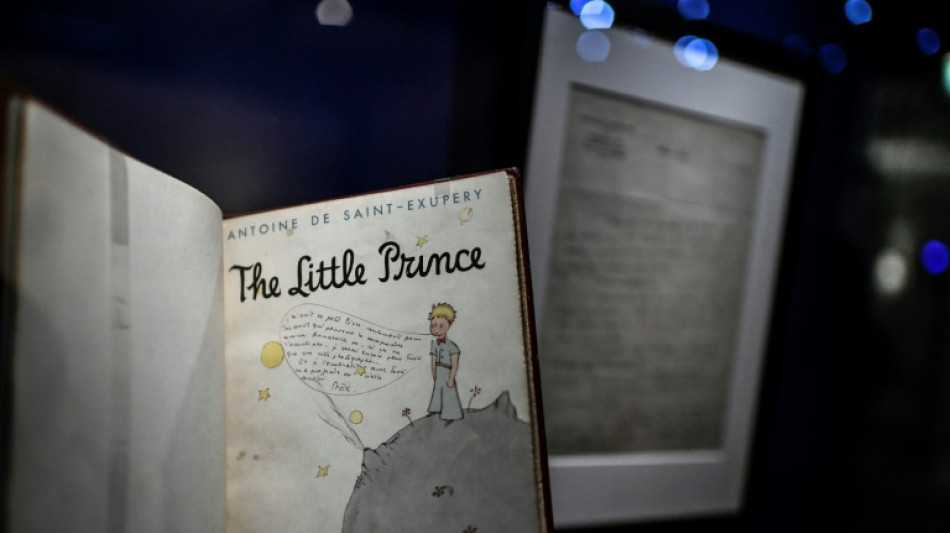
-
 Dutch plan 'nice adios' for Nadal at Davis Cup retirement party
Dutch plan 'nice adios' for Nadal at Davis Cup retirement party
-
Trump meets PGA boss and Saudi PIF head amid deal talks: report

-
 UN chief urges G20 'leadership' on stalled climate talks
UN chief urges G20 'leadership' on stalled climate talks
-
Steelers edge Ravens, Lions maul Jaguars

-
 No.1 Korda wins LPGA Annika for seventh title of the season
No.1 Korda wins LPGA Annika for seventh title of the season
-
Biden touts climate legacy in landmark Amazon visit

-
 England secure Nations League promotion, France beat Italy
England secure Nations League promotion, France beat Italy
-
Star power fails to perk up France's premiere wine auction

-
 Rabiot brace fires France past Italy and top of Nations League group
Rabiot brace fires France past Italy and top of Nations League group
-
Carsley relieved to sign off with Nations League promotion for England

-
 Sinner says room to improve in 2025 after home ATP Finals triumph
Sinner says room to improve in 2025 after home ATP Finals triumph
-
Senegal counts votes as new leaders eye parliamentary win

-
 Lebanon says second Israeli strike on central Beirut kills two
Lebanon says second Israeli strike on central Beirut kills two
-
Puerto Rico's Campos wins first PGA title at Bermuda

-
 Harwood-Bellis risks wedding wrath from Keane after England goal
Harwood-Bellis risks wedding wrath from Keane after England goal
-
'Nobody can reverse' US progress on clean energy: Biden

-
 NBA issues fines to Hornets guard Ball, T-Wolves guard Anthony
NBA issues fines to Hornets guard Ball, T-Wolves guard Anthony
-
Biden allows Ukraine to strike Russia with long-range missiles: US official

-
 Britain dump out holders Canada to reach BJK Cup semi-finals
Britain dump out holders Canada to reach BJK Cup semi-finals
-
Biden clears Ukraine for missile strikes inside Russia

-
 Ukrainians brave arduous journeys to Russian-occupied homeland
Ukrainians brave arduous journeys to Russian-occupied homeland
-
Australia not focusing on Grand Slam sweep after thrashing Wales

-
 Wales's rugby woes -- three talking points
Wales's rugby woes -- three talking points
-
Jannik Sinner, the atypical Italian star on top of the tennis world

-
 'Devil is in the details,' EU chief says of S.America trade deal
'Devil is in the details,' EU chief says of S.America trade deal
-
Kusal Mendis defies injury as Sri Lanka beat New Zealand to clinch ODI series

-
 Gatland would back change after Australia condemn Wales to record defeat
Gatland would back change after Australia condemn Wales to record defeat
-
England secure Nations League promotion, Haaland inspires Norway

-
 Sinner sweeps past Fritz to win ATP Finals
Sinner sweeps past Fritz to win ATP Finals
-
Mahrez scores as five-goal Algeria crush Liberia

-
 Toll in Tanzania building collapse rises to 13, survivors trapped
Toll in Tanzania building collapse rises to 13, survivors trapped
-
'Red One' tops N.America box office but could end up in the red

-
 NATO's largest artillery exercise underway in Finland
NATO's largest artillery exercise underway in Finland
-
Australia condemn Wales to record 11th successive loss in 52-20 rout

-
 Russian opposition marches against Putin in Berlin
Russian opposition marches against Putin in Berlin
-
Dozens killed, missing in Israeli strike on devastated north Gaza

-
 Macron defends French farmers in talks with Argentina's Milei
Macron defends French farmers in talks with Argentina's Milei
-
England players to blame for losing streak says captain George

-
 'Emotional' Martin defies Bagnaia to claim first MotoGP world championship
'Emotional' Martin defies Bagnaia to claim first MotoGP world championship
-
Slovakia beat Australia to reach BJK Cup semi-finals

-
 Sluggish Italy fight to narrow win over Georgia
Sluggish Italy fight to narrow win over Georgia
-
India and Nigeria renew ties as Modi visits

-
 Grit and talent, a promise and a dilemma: three things about Jorge Martin
Grit and talent, a promise and a dilemma: three things about Jorge Martin
-
Martin denies Bagnaia to win first MotoGP world championship

-
 Typhoon Man-yi weakens as it crosses Philippines' main island
Typhoon Man-yi weakens as it crosses Philippines' main island
-
Noel wins season-opening slalom in Levi as Hirscher struggles

-
 Tough questions for England as Springboks make it five defeats in a row
Tough questions for England as Springboks make it five defeats in a row
-
Russia pounds Ukraine with 'massive' attack in 'hellish' night

-
 McIlroy clinches Race to Dubai title with DP World Tour Championship win
McIlroy clinches Race to Dubai title with DP World Tour Championship win
-
Glastonbury 2025 tickets sell out in 35 minutes


'Little Prince' manuscript visits France for first time
The manuscript of "The Little Prince" travels to France for the first time this week as part of an exhibition about its legendary author Antoine de Saint-Exupery.
The pilot-explorer wrote his beloved tale about an alien prince and his interstellar travels while in exile in the United States in 1942, having fled France after the Nazi invasion.
He left the US the following year to fight on the North African front, leaving the manuscript with his mistress, journalist Sylvia Hamilton, who sold it to the Morgan Library and Museum in 1968.
Its first visit to Paris is part of an exhibition, "Meeting the Little Prince" at the Museum of Decorative Arts that runs from Thursday until June.
Among the treasures on display are the original watercolours of the Little Prince's asteroid home and the hero wearing his trademark long coat with red lapels.
Saint-Exupery disappeared during a mission over the Mediterranean in July 1944, never to know of the worldwide success of his book, which had been published only in the US.
But he had found his voice -- after being initially reluctant to illustrate the story himself.
The exhibition shows how long the story was in gestation, with a letter to his future wife in 1930 in which he shares his idea about "a child who discovers a treasure and becomes melancholic".
We also see what was left on the cutting-room floor: characters including a snail, a butterfly collector and an old couple that chase him from his home.
Or a discarded opening in which the narrator admits he doesn't know how to draw an airplane.
"There is always mystery around this work. Any single sheet brings up some enigma," said curator Alban Cerisier.
E.Ramalho--PC


